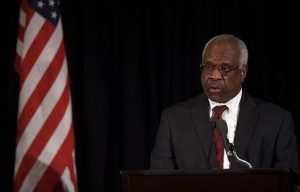Justice Thomas Wants The Court To 'Reconsider' Its First Amendment Jurisprudence
Justice Thomas uses a sympathetic plaintiff to take a dump on the case law.

(AP Photo/Susan Walsh, Pool)
Stare decisis, schmare decisis.
Supreme Court Justice Clarence Thomas apparently agrees with Donald Trump when it comes to the First Amendment. The president famously vowed to “open up the libel laws” to make it easier to sue the media (even though Trump is more likely to be burned by that change in constitutional law), and in today’s concurrence in McKee v. Cosby, Justice Thomas seems to be on board.

Early Adopters Of Legal AI Gaining Competitive Edge In Marketplace
The case surrounds the defamation claim of actress Kathrine McKee against Bill Cosby. McKee accused the comedian of raping her in a 2014 newspaper interview. The claim stems from a letter attacking McKee that attorneys for Cosby allegedly leaked on his behalf. And in his concurrence, Thomas uses a sympathetic plaintiff to take a dump on the case law.
In the opinion, Thomas argued the seminal First Amendment case of New York Times v. Sullivan (1964) and its progeny should be reexamined, calling the line of cases “policy-driven decisions masquerading as constitutional law.” He went on to argue:
“We should not continue to reflexively apply this policy-driven approach to the Constitution. Instead, we should carefully examine the original meaning of the First and Fourteenth Amendments. If the Constitution does not require public figures to satisfy an actual-malice standard in state-law defamation suits, then neither should we.”
Thomas ended his concurrence with a plain plea to return to a pre-Sullivan understanding of the First Amendment:
Sponsored

Legal AI: 3 Steps Law Firms Should Take Now

Navigating Financial Success by Avoiding Common Pitfalls and Maximizing Firm Performance

Early Adopters Of Legal AI Gaining Competitive Edge In Marketplace

Is The Future Of Law Distributed? Lessons From The Tech Adoption Curve
“We did not begin meddling in this area until 1964, nearly 175 years after the First Amendment was ratified. The States are perfectly capable of striking an acceptable balance between encouraging robust public discourse and providing a meaningful remedy for reputational harm. We should reconsider our jurisprudence in this area.”
As Law.com notes, Justice Thomas does not respect stare decisis, and has a history of saying exactly that:
The late Justice Antonin Scalia told Thomas biographer Ken Foskett that Thomas “doesn’t believe in stare decisis, period.” In a 2016 lecture at the Heritage Foundation, Thomas said, “The Constitution is the ultimate stare decisis.”
Let’s hope Chief Justice Roberts disagrees.
Sponsored

The Business Case For AI At Your Law Firm


Is The Future Of Law Distributed? Lessons From The Tech Adoption Curve
 Kathryn Rubino is a Senior Editor at Above the Law, and host of The Jabot podcast. AtL tipsters are the best, so please connect with her. Feel free to email her with any tips, questions, or comments and follow her on Twitter (@Kathryn1).
Kathryn Rubino is a Senior Editor at Above the Law, and host of The Jabot podcast. AtL tipsters are the best, so please connect with her. Feel free to email her with any tips, questions, or comments and follow her on Twitter (@Kathryn1).







